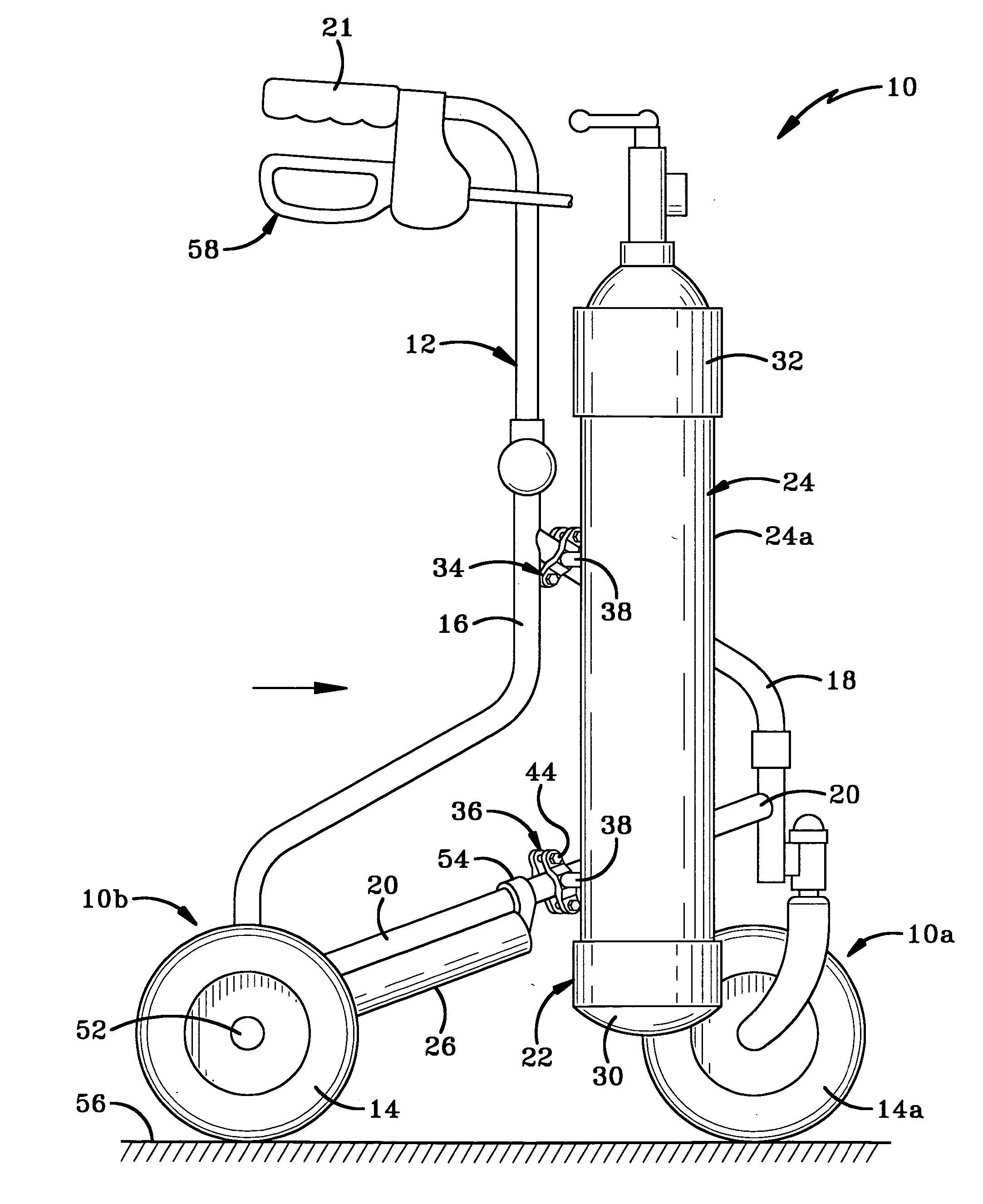Walker including supports for carrying oxygen bottles
a walker and oxygen bottle technology, applied in the field of folding walker, can solve the problems of users of mobility devices not being physically capable of walking long distances, unstable and prone to tipping, and difficulty in reducing the tendency of walker tipping, so as to reduce the walker's tipping tendency, and facilitate the elderly or disabled
- Summary
- Abstract
- Description
- Claims
- Application Information
AI Technical Summary
Benefits of technology
Problems solved by technology
Method used
Image
Examples
first embodiment
[0022] Referring to FIGS. 1-4, there is shown a walker in accordance with the present invention and generally indicated at 10. Walker 10 includes a frame 12 onto which three wheels 14 are mounted. Frame 12 is made up of first, second and third struts 16, 18 and 20 which are connected together in a manner that allows walker 10 to be folded up for storage. Handles 21 are provided on one end of first struts 16. Tank supports 22 are secured to second and third struts 18, 20 and are adapted to receive oxygen bottles 24 therein. A counterbalance 26 is mounted on each of the third struts 20. As will be understood by those skilled in the art, the size and weight of counterbalance 26 should complement the combination of the weight of filled oxygen bottles 24 to be received in tank support 22 and the height at which tank support 22 is mounted on frame 12 so as to counteract the tendency of walker 10 to tip over.
[0023] In accordance with a specific feature of the present invention, each tank s...
second embodiment
[0027] Referring to FIGS. 5-7, there is shown a walker in accordance with the present invention and generally indicated at 110. Walker 110 comprises a frame 112 with four wheels 114 mounted thereon and includes tank supports 122 and a counterbalance 126 (FIGS. 6 & 7). Walker 110 further includes a seat 160 for the user and tank supports 122 preferably are secured to seat 160 and to frame 112. A basket 162 may be provided on frame 112 for carrying personal articles (not shown). Frame 112 of walker 110 is designed to be foldably collapsible for storage purposes. Walker 110 is also provided with handles 121 and with a braking system 158.
[0028] In accordance with one of the specific features of the present invention, tank supports 122 mounted on seat 160 comprise a ring support 132 and a cupped support 130. Alternatively, tank supports 122 may comprise two spaced apart ring supports (not shown). Cupped supports 130 are mounted to an upper surface of seat 160, proximate one end thereof. ...
PUM
 Login to View More
Login to View More Abstract
Description
Claims
Application Information
 Login to View More
Login to View More - R&D
- Intellectual Property
- Life Sciences
- Materials
- Tech Scout
- Unparalleled Data Quality
- Higher Quality Content
- 60% Fewer Hallucinations
Browse by: Latest US Patents, China's latest patents, Technical Efficacy Thesaurus, Application Domain, Technology Topic, Popular Technical Reports.
© 2025 PatSnap. All rights reserved.Legal|Privacy policy|Modern Slavery Act Transparency Statement|Sitemap|About US| Contact US: help@patsnap.com



